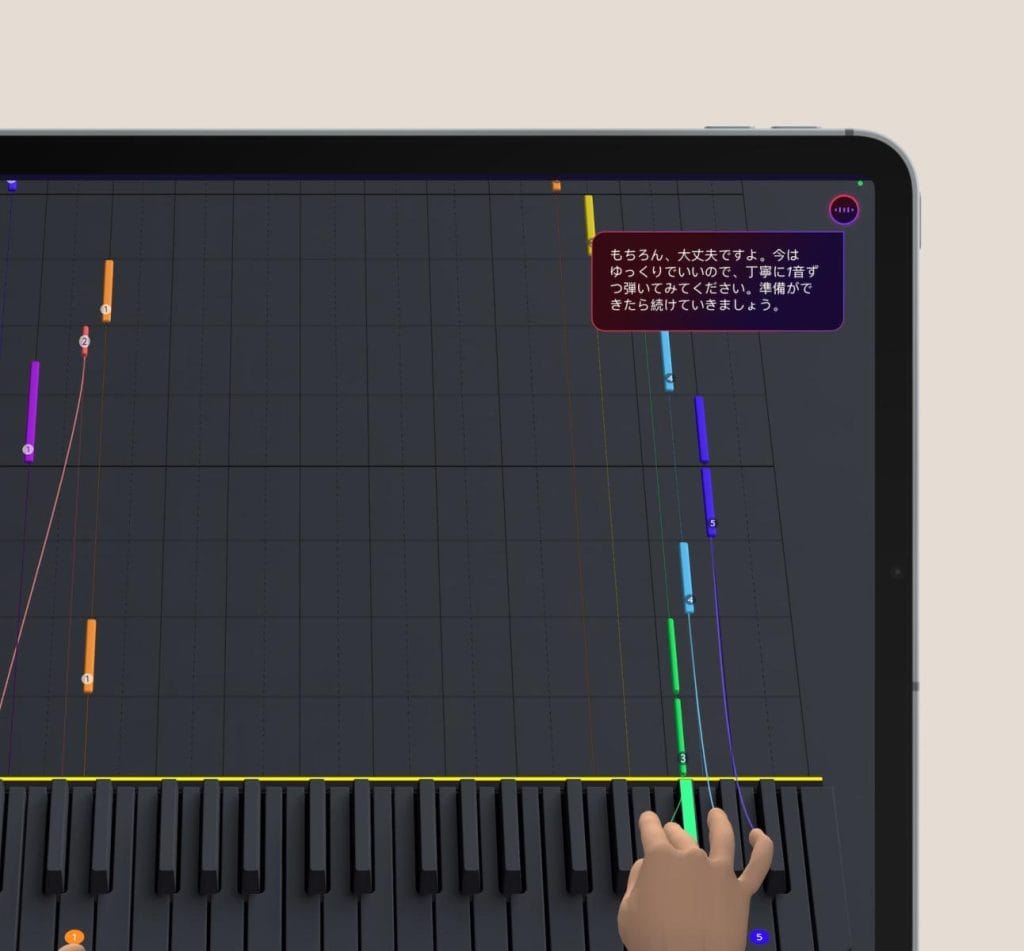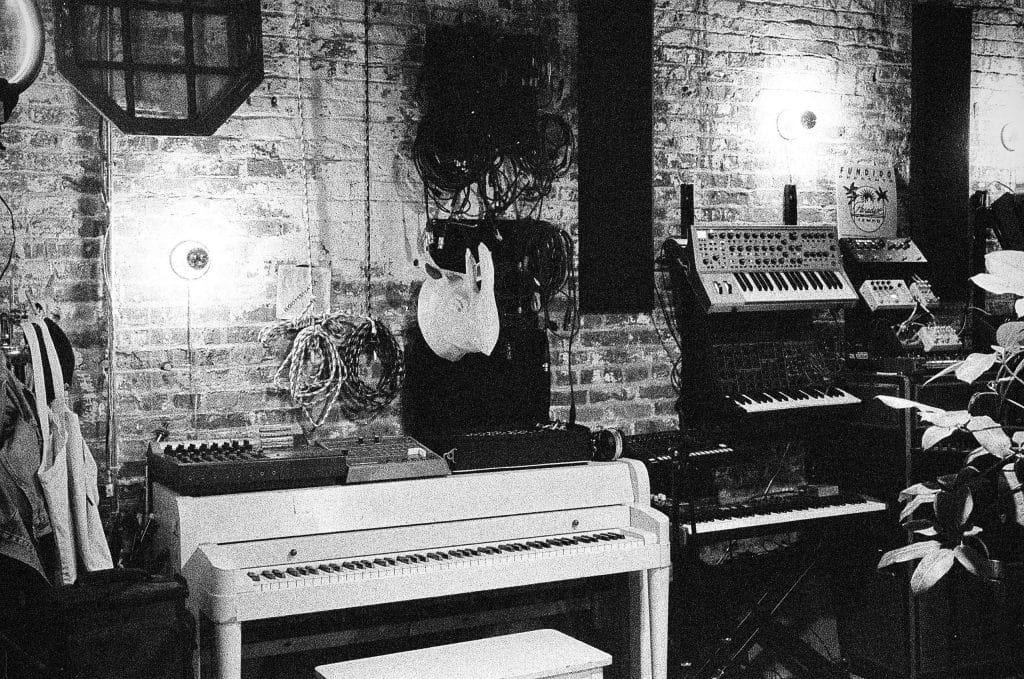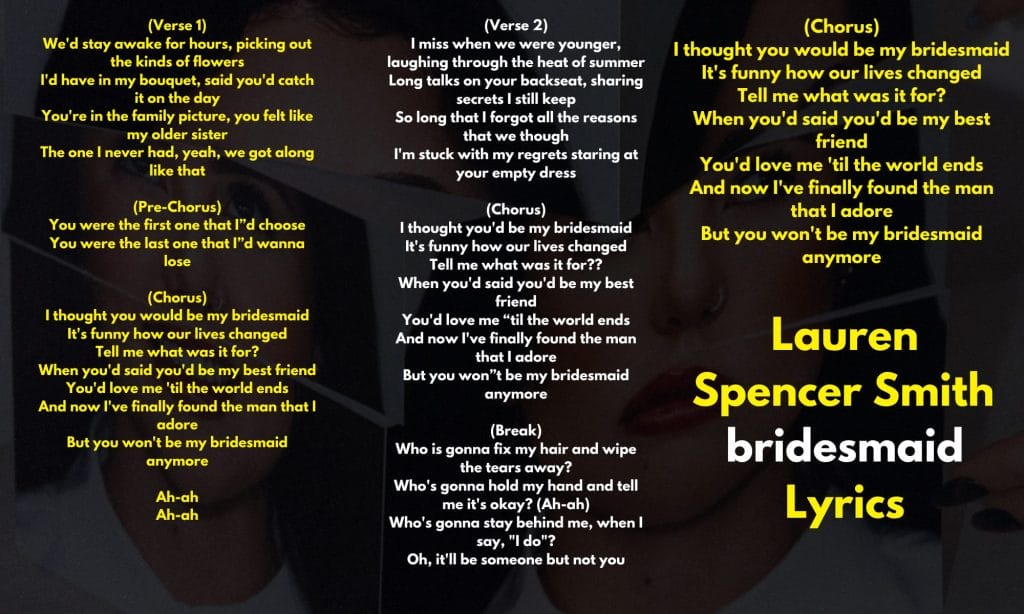Table of Contents
Image C/O Three Names Productions Under UMG; For Critique and educational purposes.
When I first heard Lauren Spencer Smith’s “Bridesmaid,” what struck me wasn’t just the sadness—it was the quiet precision of it. This isn’t a dramatic breakup ballad or a soaring anthem about betrayal. It’s smaller than that, more intimate. It’s about the kind of grief that happens when someone quietly leaves your life without explanation.
That kind of loss has a long literary history, and in this piece, I want to bring my background in English literature and creative writing to bear on the lyrics—to place them in conversation with the kinds of poems and stories that have been circling this emotional territory for centuries.
These are just my own observations, shaped by the way I’ve come to read both song and text over the years, but I hope they offer a more nuanced way into what this song is doing beneath the surface.
Analyzing lyrics like these is, for me, a good excuse to stretch the literary muscles a bit.
Pop songs—especially ones this direct—can sometimes feel easy to interpret, but the emotional complexity at work here deserves a closer look. There’s something timeless in what Lauren is singing about: the unexpected erosion of a friendship that once felt unshakable. To make sense of that, I’ll be drawing from poets like Eavan Boland, Jack Gilbert, and Anne Stevenson—writers who’ve each captured the ache of emotional distance and the strange weight of being left behind.
We’ll even let a few ideas from modern fiction and fantasy into the room, because when it comes to understanding why people disappear from our lives, literature tends to ask the same questions the best songs do.
bridesmaid at a glance
- A breakup song, but the kind where no one’s dating and no one knows who ended it
- The pain lands harder because the lyrics stay grounded—empty dresses, quiet car rides, and plans that don’t get to happen
- At its core, it’s about emotional drift: when someone doesn’t fight with you, they just quietly stop showing up
Bridesmaid Lauren Spencer Smith Lyrics
Bridesmaid Meaning
Verse 1: A Friendship That Felt Like Forever
“We’d stay awake for hours, picking out the kinds of flowers
I’d have in my bouquet, said you’d catch it on the day
You’re in the family picture, you felt like my older sister
The one I never had, yeah, we got along like that”
Right from the start, this verse shows us a friendship that was more than just close. This person was part of the speaker’s imagined future. They stayed up late dreaming together. They planned the wedding, down to the bouquet and the tradition of catching it. That kind of detail tells me they didn’t just talk about love or marriage—they pictured being in each other’s lives forever.
The line “you felt like my older sister” tells us how deep the bond went. This wasn’t just a best friend. It was chosen family. What I find really important here is that there’s no hint of a fight or betrayal—just a memory of closeness. That makes the absence we’ll see later feel even harder.
This reminds me of Eavan Boland’s poem “The Pomegranate.” In that poem, Boland talks about a relationship between a mother and daughter, but it’s really about how all relationships change with time. She writes about holding onto memories even as people grow apart. Just like this verse, Boland shows how love can stay alive in memory, even after distance has taken its toll.
Pre-Chorus: A Clear Choice, Now Lost
“You were the first one that I’d choose
You were the last one that I’d wanna lose”
This is one of the most direct lines in the whole song. It’s plain language, but full of meaning. To me, these lines say, “You mattered most. I trusted you most. And now you’re gone.” That shift—from being first in line to no longer there—isn’t just about disappointment. It’s grief.
And not the kind of grief we talk about when someone dies. It’s the grief of losing someone who’s still around, just not with you. That’s something Anne Stevenson explores in her poem “The Marriage.” In that poem, Stevenson talks about being physically near someone but feeling distant from them emotionally. It’s that kind of distance—when someone you used to count on just isn’t who they used to be to you. I believe this pre-chorus gives us a first glimpse of that shift.
Chorus: The Moment of Realization
“I thought you’d be my bridesmaid
It’s funny how our lives changed
Tell me what was it for?
When you’d said you’d be my best friend
You’d love me ’til the world ends
And now I’ve finally found the man that I adore
But you won’t be my bridesmaid anymore”
This chorus is the emotional center of the song. It’s just honest. The speaker thought her friend would stand beside her on her wedding day. That was the plan. And now, that plan is broken.
The question “Tell me what was it for?” hits hard. It asks what the point of all that closeness was if it ended like this. In my opinion, this is the key emotional question of the whole song. Not “what happened?” or “who’s to blame?”—just “why did it matter, if it ended this way?”
That’s something Jack Gilbert gets at in his poem “Failing and Flying.” He writes about love ending, and whether that means it failed. One of his most famous lines is, “I believe Icarus was not failing as he fell, but just coming to the end of his triumph.” I think this lyric and that line from Gilbert are saying something similar: Just because something ended doesn’t mean it wasn’t real. It mattered while it was happening. But that doesn’t stop the end from hurting.
Verse 2: Memories That Still Hurt
“I miss when we were younger, laughing through the heat of summer
Long talks on your backseat, sharing secrets I still keep
So long that I forgot all the reasons that we fought
I’m stuck with my regrets staring at your empty dress”
This verse brings us back to memory again, and that memory feels warm, safe, and full of trust. I find it especially powerful that the speaker still keeps the secrets they shared. That tells me the love hasn’t completely faded. There’s still a trace of that old loyalty, even though the friendship is gone.
But there’s also confusion. “I forgot all the reasons that we fought.” That line tells me that whatever caused the distance might not have been clear or dramatic. It could have been slow, quiet, and messy. That makes it harder to grieve.
Again, this reminds me of Boland’s work. In “The Pomegranate,” she writes about how love stays in the body, even as time changes everything else. The speaker here is holding on to pieces of that love, even as she looks at the friend’s “empty dress”—a symbol of absence so concrete it’s painful. That dress was meant to be filled. Now it’s not.
Bridge: Who Will Be There Now?
“Who is gonna fix my hair and wipe the tears away?
Who’s gonna hold my hand and tell me it’s okay?
Who’s gonna stay behind me, when I say, ‘I do’?
Oh, it’ll be someone but not you”
This bridge is where the song shifts from sadness to quiet acceptance. The questions are simple, but they carry so much weight. These are the things that friends do—hold hands, offer comfort, show up. And this friend won’t be doing those things.
What’s interesting is the way the speaker answers her own question: “It’ll be someone, but not you.” That line, in my opinion, is where she starts to let go. It still hurts, but she’s not stuck in the past anymore. She’s preparing to move forward, even if she’s doing it with a different person beside her.
That idea connects again to Jack Gilbert. In “Failing and Flying,” he shows that we don’t always get the ending we want, but we can keep going. This song does the same thing. It ends with acceptance.
Connecting All These Dots
One of the clearest things this song puts on the table is how personal grief can get when it’s not tied to death, but to distance. The absence here isn’t about losing someone forever—it’s about the day-to-day reality of someone not being where you always thought they would be. And it’s that kind of quiet emotional distance that Eavan Boland writes about so sharply in “The Pomegranate.” Boland’s poem doesn’t offer closure; it sits inside the tension of what it means to love someone who you can’t quite reach anymore. The mother-daughter connection in that poem isn’t broken, just different—and that’s what makes it painful.
That same shift is happening in “Bridesmaid.” The friendship hasn’t exploded.
There’s no villain here. But there’s a clear before and after. That idea came up in some of the fan commentary I read, which talked about the song not being about “drama” but about “growing up and out of sync.” That reading tracks with how Boland handles emotional change—not with conflict, but with time.
I also keep coming back to the question the speaker asks in the chorus: “Tell me what was it for?” That line does more than express hurt—it’s reaching for meaning. And in my opinion, this is where the connection to Jack Gilbert’s “Failing and Flying” becomes useful. Gilbert doesn’t try to solve or fix anything in that poem.
He’s just asking whether the value of something can still hold, even when it’s over. That’s exactly what the speaker’s wrestling with here. She’s saying: if we were so close, if we meant so much to each other, why does it feel like it meant nothing now that you’re gone? Some of the smarter fan interpretations I saw pointed this out too—how the song isn’t trying to make the other person look bad, it’s just sitting in the gap between what was said and what ended up happening. That’s why the line about catching the bouquet hits harder.
And then there’s the very real setting of the wedding itself. A wedding is public, formal, symbolic—it’s one of those moments when you take stock of who’s actually standing next to you. And when the speaker says “someone will be there, but not you,” she’s not just naming absence—she’s naming replacement. That brings us to Anne Stevenson’s “The Marriage,” where the loss isn’t physical but emotional. Stevenson writes about being close to someone who’s no longer emotionally invested, and I think that’s the feeling the song captures too—not just “you’re not here,” but “you’re no longer with me in the way you once were.”
There’s a line in one of the Reddit posts (I can’t find it anymore, sorry I can’t link it!)where someone says this song felt like “mourning a friendship no one else knew you were still grieving,” and I thought that was dead-on. That’s the kind of loss Stevenson understood, and it’s what “Bridesmaid” circles the whole way through.
The post Bridesmaid Lauren Spencer Smith Lyrics And Meaning: Loss As Distance appeared first on Magnetic Magazine.






